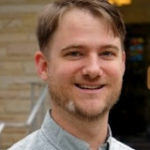
How to talk about joy?
How to talk about joy as someone whose Advent walk is always in the familiar company of anxiety and depression?
How to talk about joy as someone who flinches at suggestions of forced jolliness, who has become hyper-aware of the tendency of churches to try to force positivity as a stand-in for the depths of faith?
This Sunday, the third Sunday of Advent, is sometimes known as Gaudete Sunday, from the first word of the Latin Mass, which in turn derives from Philippians 4: “Rejoice in the Lord, always; again I will say, rejoice.” Always, Paul? What about when I’m wracked with depression? What about when intrusive thoughts threaten to choke my day? Always? What if I don’t want a pink candle? What if penitential purple is more my speed?
This year, I am thinking of the chorus of “O Come, O Come, Emmanuel,” a hymn which for me somehow manages to hold this tension well: “Rejoice, rejoice!” the chorus echoes, but in a haunting tone, a minor key. It is a song of joy, and it is a song that speaks of mourning, and it holds both within its melodic arms.
This year, I am thinking back to a year ago, to the reflection of the Christmas lights in my then-newborn child’s eyes, the beauty of the sight, the way my heart swelled with something much more raw than could be captured by the word “Happy.”
This year, I am thinking of the thing for which we wait, a birth that we proclaim shakes the world and yet which occurs in quiet and darkness, in anonymity, much like the emptying of the tomb which it presages. A mother, singer of prophetic songs, huddled over her baby with the same protective spirit of which her ancestors spoke of God, sheltering the faithful underneath solicitous wings.
The hymn’s notes fade out; the lights glow quietly; and there, in that imagined, manger scene, I can make it out, this thing which I’m never quite sure how to talk about:
This quiet, fierce joy.

David Finnegan-Hosey
David Finnegan-Hosey is the author of Christ on the Psych Ward and Grace is a Pre-Existing Condition: Faith, Systems, and Mental Healthcare. He serves as College Chaplain and Director of Campus Ministries at Barton College. He holds an M.Div from Wesley Theological Seminary and a unit of Clinical Pastoral Education from the National Institutes of Health Clinical Center. He is certified by Mental Health First Aid USA to provide initial help to people experiencing depression, anxiety, psychosis, and substance use disorders. In 2011, David was diagnosed with bipolar disorder after a series of psychiatric hospitalizations. He now speaks and writes about the intersections among mental illness, mental health, and faith. David lives in Wilson, NC with his wife Leigh, their daughter Laila, and their dog Penny Lane.